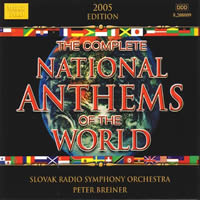Marco Polo’s do-it-yourself Hymnen
|
Ethelbert Nevin [November 2005.]
“The Complete National Anthems of the World.” Slovak Radio Symphony Orchestra, Peter Breiner (arr. and cond.). Marco Polo 8.208009 (http://www.naxos.com/). On the fifth Thursday of a month containing the letter “p,” I host the poker game. My responsibilities comprise music, nosh, and game supplies. I set the usual standbys aside: Ono, Piaf, Ms. F.F. Jenkins et al., opting instead for a new Marco Polo release, “The Complete National Anthems of the World,” 2005 edition, eight discs. Arranger Peter Breiner conducts the Slovak Radio Symphony Orchestra. By any reasonable measure, this is an insane undertaking, reflecting not just dedication, but a whole lot of research. The first version (1998’s Marco Polo 8.206001) spanned just six discs. The introductory note by Erwin Hoheisel of the German-based Archives for International States Symbolism informs us that several national entities have introduced new anthems since the time of the earlier set, among them Afghanistan, Bosnia and Herzegovina, Congo-Kinshasa, East Timor, Iraq, Russia, Rwanda and Somalia. The box indicates a playing time of 9:36:40. I’ve every confidence others out there are as eager as I to set a day aside for playing all eight discs. Many countries have multiple representations. For example, the set includes IOC-sanctioned Olympic versions that lop off repeats and amputate verses. It will come as no surprise that most of these anthems are optimistic, major-key affairs. Romania and The Turkish Republic of North Cyprus are among the few set in a minor key. Among the grimmest, the Azerbaijan anthem yet falls well short of black armbands. As far as I can tell, tracks are recycled for states that share tunes. For reasons in all likelihood historical, many places employ “God Save the Queen” or the “Marseillaise.” Liechtenstein and “Norway’s Royal Song” both apply Great Britain’s tune to presumably different words. What makes a good anthem? Familiarity prevents objectivity. Take the “Marseillaise,” here harmonized differently than is customarily heard: It sounds less solemn owing to added grace notes at the first line’s “Patrie,” and later, a frilly trill at “Mugir.” Is it a great tune because we immediately conjure “Liberté, Fraternité et Egalité”? Would we grow to have feelings for an unfamiliar tune if there were strong associations: a favorite tourist spot, military service, or a sports victory? I’m sure there are stories to be told. Why do the oldest countries tend towards classical tunes which adhere to four-part harmonies and strict counterpoint? England’s anthem (The Constituent Kingdom of England) is derived from Elgar’s Pomp and Circumstance March No. 1. What could be more conventional? And why do some 19th-century anthems sound like Gilbert & Sullivan? Indeed, Rossini could have penned Brazil’s or Uruguay’s 5:05 mini-tone poem. A lot of the non-European national tunes, especially those from Africa, have prominent percussion. (I recall Tibor Kalman’s portrait of Queen Elizabeth.) Rwanda’s anthem flaunts percussion-heavy pentatonics. Gambia’s features subtle toms. Among anthems with modal melodies are those of Bangladesh, Bhutan, Burundi and Kenya. Mauritania’s — not to be confused with Mauritius — consists of a truly exotic tune. India’s ends on a puzzling half-cadence. There’s no way to describe Tibet’s as other than celestial. Is an anthem memorable if you don’t know the words? The lovely waltz-like Guernsey anthem was the only one which prompted replay (and a trip to the atlas). Malta’s has a nicely ornamented tune. The Netherlands Antilles’ anthem is rather sweet in a Broadway-toe-tapping way. Senegal’s is remarkably stately. And then there are the several eyebrow-raisers. Russia’s elevator-jazz alternate is downright embarrassing. And why does the USA have a 2005 version? Had some dominant-seventh chord been declared unpatriotic? Actually, so many folks disliked Breiner’s first version that he had to create another. However well-intentioned, Breiner singed somewhat in the spotlight’s hot glare for his deviant “Oh Canada” at the Athens Olympics (see here). At least, like Stravinsky, he wasn’t arrested by the Boston police for his reharmonization of our national tune. The set’s eight discs are encased in individual jewel boxes as sensible packaging for radio stations or those who might actually need only one or two tracks. A 36-page booklet offers each country’s flag and coat of arms or seal, the tune’s name, a translated first line, credits for author and composer, and the year the anthem was adopted. Gathered around the felt-covered table amidst stacked chips and scattered cards, we suppressed whatever urges to stand and salute. Eyes watered now and then. We could never guess the country at play, but that didn’t matter. We were listening to expressions of pride.
[More Ethelbert Nevin]
[Previous Article:
"This Represents At Least a Thousand Words I Was Not Counting On"]
[Next Article:
“Come io passo l’estate”: Italian Vacation 3.]
|
